Decoding the Diets: From Keto to Vegan, and Everything in Between


Are you vegan? Vegetarian? Paleo? Gluten-free? If so, you’re probably passionate about the diet you follow. Most people are!
The very definition of the word “diet” itself has evolved over the years. When we were growing up, the term “diet” typically referred to a weight-loss plan. Everybody’s mom was on a diet! After years of dieting proved largely unsuccessful at maintaining weight loss for most people, it became clear to researchers that dieting for weight loss was far more successful if it was a long-term, sustainable lifestyle change. Now, the word “diet” more commonly refers to an eating plan targeting good health, with potential weight loss as a side effect.
I’ve never written specifically about this topic before, but I recently received an email from an Empty Nest Blessed reader who urged me to look into the vegan diet. A mutual friend of ours had embraced that lifestyle, and talking with her had caused this reader to become more aware of the food choices she made and the products she purchased based on company practices involving animals.
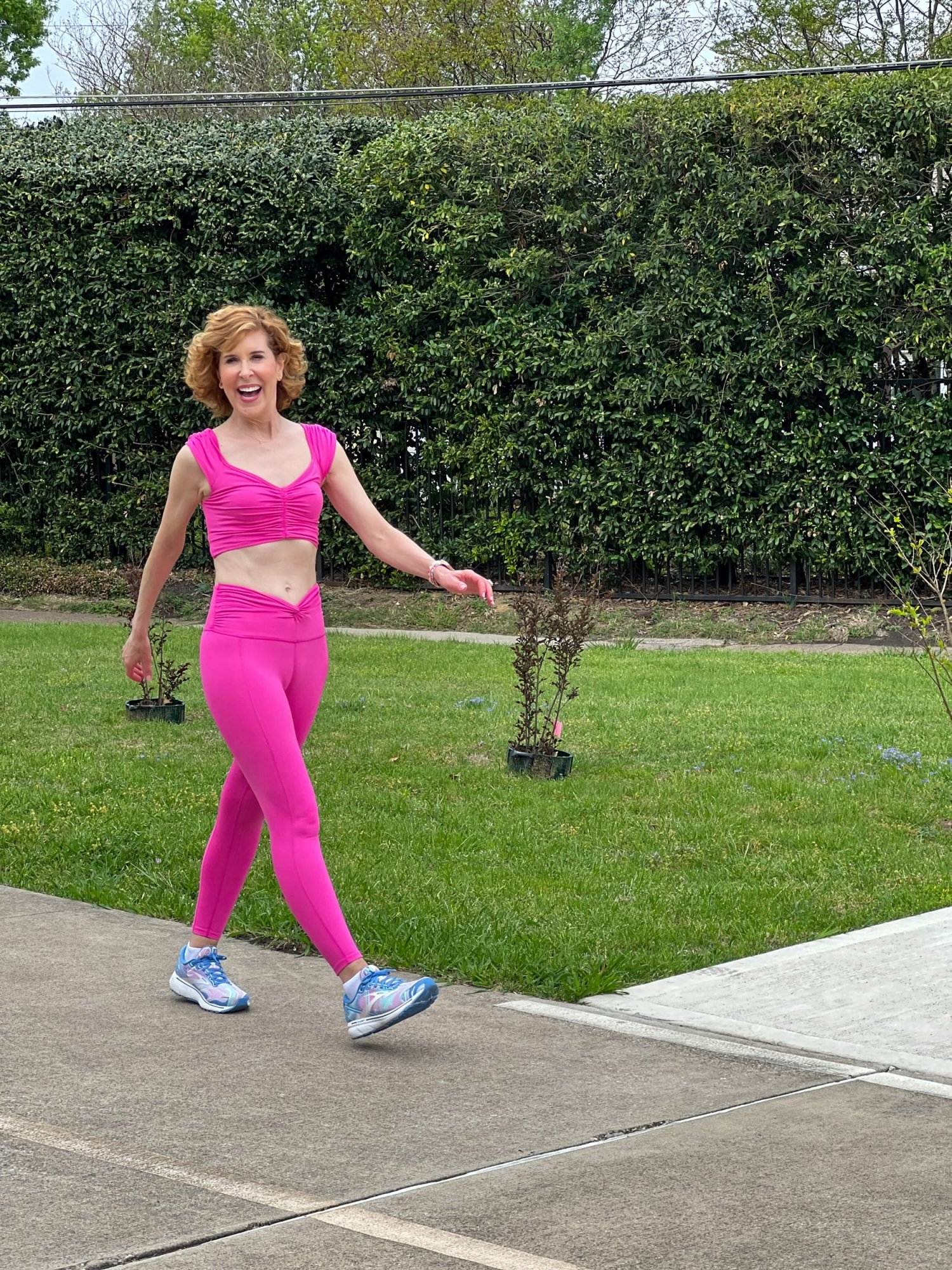
How to Lose Weight
When You’re Over 50
Already a subscriber? Enter your email – you won’t be subscribed twice!
Her email made me stop and wonder why I’d never written on this topic before, and after much thought, I finally figured it out. It’s because eating is pretty personal. It’s sensitive. It’s tender. Many people put a lot of thought into it and have strong convictions about the diet they’re following and why. In some cases, they think the diet they embrace is the best choice for everyone. In others, they’re respectful, non-judgemental, and they understand that the diet they follow may not be the right choice for everyone.
Today, I’m running down the various diets (Eating plans? Eating programs? Eating systems?) that are popular right now. You probably have a friend or a family member who follows each of these! My hope is that being able to more fully comprehend their convictions will result in greater acceptance and understanding within your relationships.
This post is a cursory (at best) explanation of the popular diets that people talk about, not a “review,” and I’m not advocating one over another. I don’t have the space to be comprehensive (nor am I qualified to do that!), but I will provide links for more information about each. At the end of the post, I’ll share my diet, which is probably going to surprise you!

Decoding the Diets: Anti-Inflammatory
What It Is: Developed by Dr. Andrew Weil, it’s similar to the Mediterranean diet in its focus on fresh foods. This largely plant-based diet focuses on whole, unprocessed foods thought to reduce inflammation.
What You Eat: If you follow this diet, you eat healthy fats, lots of fruits and vegetables, whole grains, fish, tea (instead of coffee), dark chocolate, and even red wine. You avoid excessive amounts of animal protein, with the exception of oily fish.
What it Does: It’s believed that the phytochemicals prevalent in anti-inflammatory diets protect cells and organs from low-level, chronic inflammation, which is linked to heart disease, cancer, arthritis, and other health conditions like psoriatic arthritis and rheumatoid arthritis.
Why People Love It: It’s nutritionally sound and not overly restrictive.
What the Experts Say: Proving that eating anti-inflammatory foods prevents specific diseases is a significant scientific challenge. The jury is still out, but research is ongoing.
Click HERE for more online information and for a good basic resource/cookbook. Also, for my recent post on inflammation, click here.
Decoding the Diets: Gluten-Free
What It Is: This diet was originally developed to manage celiac disease, an auto-immune disease in which gluten triggers immune system activity that damages the lining of the small intestine. Other medical conditions associated with gluten intolerance warrant adherence to the diet, include non-celiac gluten sensitivity, gluten ataxia, and wheat allergy.
What You Eat: This diet excludes the protein gluten, which is found in grains such as wheat, barley, and rye.
What It Does: Adherence to a strict gluten-free diet is a lifelong necessity for people with celiac disease. For people with non-celiac gluten sensitivity, the condition may not be lifelong.
Why People Love It: Proponents without related auto-immune diseases or a wheat allergy claim improved health, weight loss, increased energy, and improved gastrointestinal health.
What the Experts Say: Since eliminated foods provide important vitamins and other nutrients, individuals on a gluten-free diet need to watch for potential deficiencies of iron, calcium, fiber, thiamin, riboflavin, niacin and folate. Very little clinical research has been conducted on the benefits of a gluten-free diet for people who do not have a gluten-related medical condition.
Click HERE for more online information and for a good basic resource/cookbook.

Decoding the Diets: Intermittent Fasting
What It Is: In one approach to intermittent fasting, participants eat very few calories on certain days, and eat normally the other days. In the other approach, participants only eat during certain hours of each day and fast the remaining hours.
What You Eat: To lose weight and get the nutrients you need, you should stick to healthy foods and limit treats like dessert and processed foods on eating days. On fasting days, you’ll eat very little food or none at all.
What it Does: It’s believed that depriving cells of calories slows the progression of certain age-related diseases. Studies show a decrease in some of the body’s inflammatory markers and improvement in the body’s use of insulin. Some research shows that this type of diet may curb symptoms of asthma.
Why People Love It: People lose weight because they take in fewer calories overall and regulate their blood sugar. Also, it works with food restrictive diets like vegetarian or vegan, or high- or low-carb.
What the Experts Say: Studies have found lower blood sugar, blood pressure, and cholesterol levels, but there is concern that shortening the eating window makes it challenging to get the vitamins and minerals needed for good health.
Click HERE for more online information and for a good basic resource/cookbook.
Decoding the Diets: Ketogenic (Keto)
What It Is: The Keto diet was created at the Mayo Clinic in 1924 by Dr. Russell Wilder to combat epilepsy.
What You Eat: Ideally, 60% of calories are supposed to come from fat and 35% from protein, with just 5% from carbs. People on this diet eat lots of fat and protein, meat, cheese, oil, butter, cream, and low-carb veggies.
What It Does: By depriving the body of carbohydrates, it lowers blood sugar and insulin levels, prompting the body to utilize ketone bodies (produced by the liver) for fuel. (Called ketosis.)
Why People Love It: People lose weight quickly, feel fuller, and experience fewer cravings.
What the Experts Say: While it’s primarily a diet to lose weight, it may help with certain conditions, such as epilepsy. There are concerns, however. Recently, a study presented at the American College of Cardiology’s annual meeting found that people on low-carb diets were 18 percent more likely to develop atrial fibrillation than those on a moderate-carb diet.
Click HERE for more online information and for a good basic resource/cookbook.

Decoding the Diets: Mediterranean
What It Is: This diet is based on the traditional foods that people eat in countries bordering the Mediterranean Sea. It was developed after researchers noted that people living in that area were exceptionally healthy compared to Americans and had a low risk of many lifestyle diseases.
What You Eat: A primarily plant-based diet, including foods such as fruits and vegetables, whole grains, legumes, and nuts. It encourages replacing butter with healthy fats such as olive oil and the use of herbs and spices to add flavor to foods instead of salt. Fish or poultry are favored over red meat.
What It Does: Numerous studies confirm that it causes weight loss, helps prevents heart attacks, strokes, type 2 diabetes, and premature death.
Why People Love It: With a focus on fresh, flavorful foods, it’s easy to maintain and can be highly successful for long-term weight loss. (And it includes wine!)
What the Experts Say: It’s typically a physician favorite. It ranked as the #1 (out of 41) best diet in a recent U.S. News and World Report evaluation.
Click HERE for more online information and for a good basic resource/cookbook.
Decoding the Diets: Paleo
What It Is: This diet was created by gastroenterologist Walter Voegtlin in the 1970s with the idea that Paleolithic ancestors, who lived in a range of time from 2.5 million to 10,000 years ago, could teach modern men how to eat healthily. Although somewhat similar to Keto, in a Paleo diet, most of the calories consumed come from protein, whereas in Keto, they come from fat.
What You Eat It allows entire food groups (like meats, fruits, vegetables, and healthy fats) and avoids others (like dairy, processed foods, and grains).
What It Does: It promotes a “clean” diet without additives, preservatives, or chemicals, and the plant nutrients in fruits, vegetables, oils, nuts, and seeds may provide anti-inflammatory benefits.
Why People Love It: It causes weight loss (probably because the caloric intake is less overall), and it’s less restrictive than Keto.
What the Experts Say: Although it’s rich in vegetables, fruits, and nuts — all elements of a healthy diet, there are concerns about the absence of fiber and vitamins provided by whole grains and legumes, and calcium from dairy products.
Click HERE for more online information and for a good basic resource/cookbook.
Decoding the Diets: Vegan
What It Is: Although similar to vegetarianism, vegans eliminate all animal products from their diets, including dairy and meat. Some vegans extend the diet to include clothing and cleaning products.
What You Eat: Fruits, vegetables, whole grains, nuts, seeds, and legumes. No meat, poultry, eggs, dairy, or anything made from animal parts. (This can be challenging, as animal products, like butter, butter substitutes, lard, and gelatin are hidden in many processed and baked goods.)
What It Does: Since vegans typically eat fewer calories, they generally weigh less and have a lower body mass index and good heart health. It can be a good option for those with diabetes.
Why People Love It: Many people, like my friend above, adhere to it not only for health reasons but also for strongly-held convictions about the treatment of animals and/or the environment.
What the Experts Say: Recent studies have confirmed improved heart health and reduced rates of cancer, lower cholesterol, and blood pressure. Cautions include potential deficiencies in iron, calcium, and B12 (found naturally only in animal products).
Click HERE for more online information and for a good basic resource/cookbook.

Decoding the Diets: Vegetarian
What It Is: Typically, a vegetarian diet is free of meat, fowl, and fish, although there are variations, including lacto-ovo vegetarians, who avoid animal flesh but eat eggs and milk products and pescatarians, who eat fish and seafood.
What You Eat: Non-meat protein sources such as grains, beans, lentils, and soy-based products as well as fruit, vegetables, and nuts. No animal products except for dairy products and eggs.
What It Does: Reduces the risk of diseases like Type 2 diabetes and heart disease.
Why People Love It: Many vegetarians believe a meat-free diet is more healthful, and a more ethical way to live, citing inhumane practices and the high environmental cost of raising animals for consumption.
What the Experts Say: Studies show that reducing or eliminating red meat results in lower triglycerides, glucose levels, blood pressure, and body mass index (BMI). Due to diversity within the vegetarian community, it’s challenging to prove a strong direct link to cancer-reduction, but most scientists agree that it’s there. (Most vegetarians exercise and have lower body weight, which also links to lower cancer risk.) Challenges include potentially getting enough protein and iron.
Click HERE for more online information and for a good basic resource/cookbook.
For information on diets that I didn’t discuss, click here.
My Diet
As I shared in this recent post, I have celiac disease. I also have lupus, dairy sensitivity, and migraines. Yes, I’m pretty much a mess! (In fact, those last three links went to foundations specifically for those conditions! No one wants to have diseases with their own foundations! Hahaha!) I don’t talk about my issues much because they are not who I am. They’re something I have. By this age, if I’ve learned one thing, it’s that everyone has something (whether they talk about it or not). 🙂
When it comes to my diet, I mostly follow an anti-inflammatory diet, with gluten-free and dairy-free modifications. I also have to modify for migraine triggers, eliminating otherwise healthy foods like nuts, avocados, bananas, yogurt, and soy. What that means is that I have pretty limited choices. (Lemme tell you, I am a nightmare to take to restaurants!) I eat a lot of , ( I like the vanilla flavor), lean meats and fish, berries, and vegetables. But if you follow me on Instagram, you also know that I’m addicted to popcorn, I love Diet Dr. Pepper, and I’m always up for a lettuce-wrapped In-N-Out burger and fries! Hey, balance, right?!
I hope this post helped you understand the most popular diets a little bit better. Writing and researching it helped me! I definitely had some misconceptions. Did you? What eating plan, er, eating system, er, eating program, er…diet do you follow and why? Leave me a comment and let me know your thoughts on this post, okay?
Scallop Cami | Black Duster | Black Stretch Slim Ankle Pants | Scallop Heeled Sandals | Earrings (similar)
If you read my post on the 2019 Spring & Summer Style Trends, then you know that this look is perfect for spring! With scallops on the shoes and the cami too, it’s right on point. I’ve said it before, but I think a black duster is pretty much a wardrobe staple for women over fifty. The flattering and slimming lines are fantastic! This one is under $50 and the ribbed knit and button detailing at the sleeve are such pretty touches. My cami is a much less expensive dupe of one by designer Ted Baker! It comes in multiple color options; it’s the perfect layering piece; and it’s machine washable. #winner









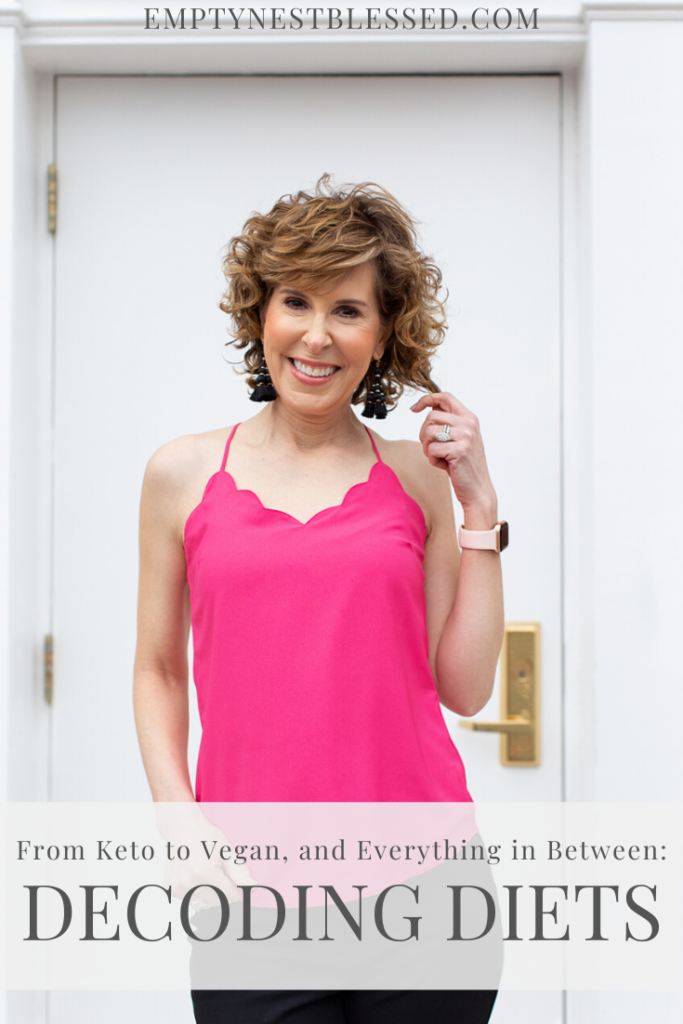


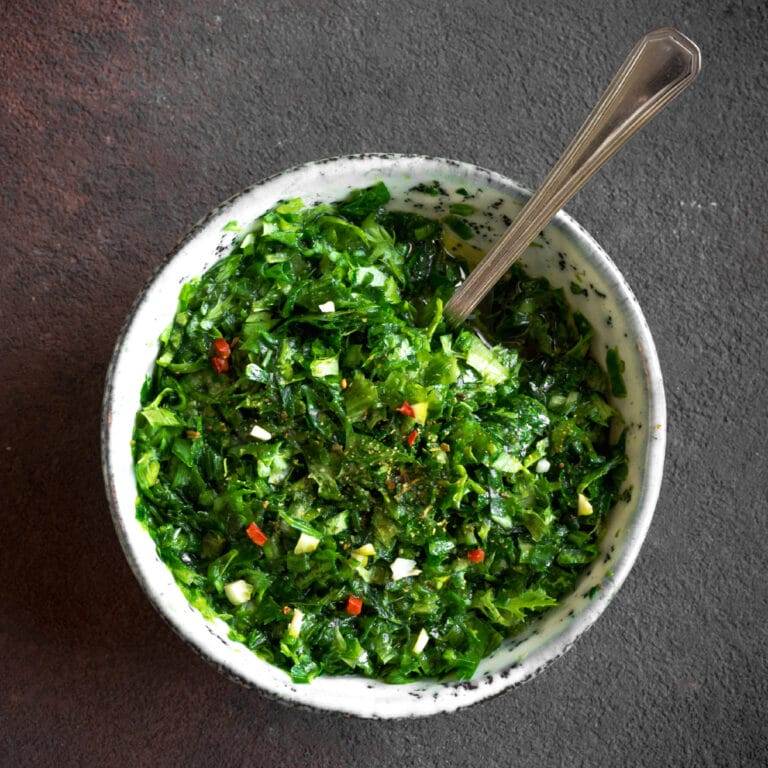
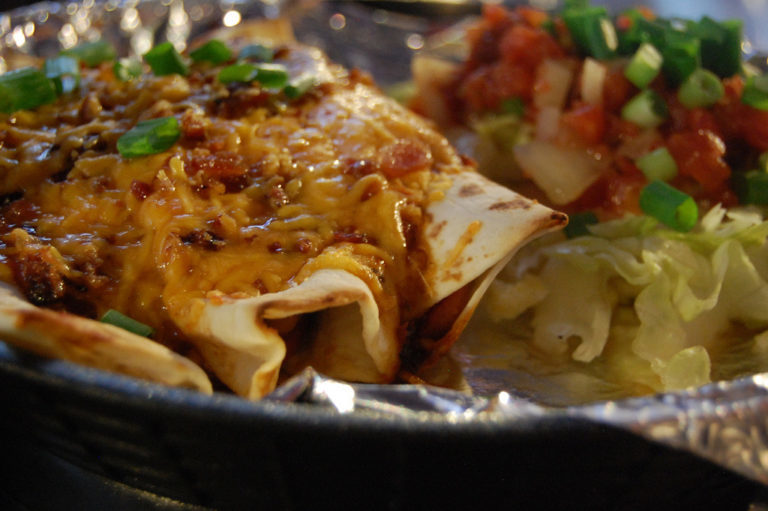





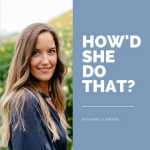



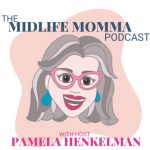



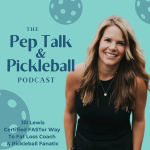


Hi Suzy –
I really like this post. Have often wondered about some of these diets. I am hypothyroid with the added problem of fibromyalgia. I try to avoid highly inflammatory foods. No red meat, no dairy, very, very little sugar ( have tried to eliminate it entirely but my gosh, it’s in everything). I limit nightshade vegetables, but my husband is of Italian descent and would probably die if he couldn’t have pasta, tomatoes, eggplant etc! I drink unsweetened almond milk because dairy doesn’t work for me. So I guess you could add lactose intolerant to my list of food issues. I order the exact same thing at every restaurant. So boring! Thanks again for this post and have a blessed day,
Suzanne, Thanks for your comment! I do the same thing at restaurants! So boring, but it’s not worth the risk of having an adverse reaction. I’m so glad you liked the post and so appreciative that you shared your situation with me! xoxo Suzy
Hi Suzy,
This is a great overview … makes for a very helpful post!
I’m so sorry you have to deal with those various health challenges. My new daughter-in-law has celiac disease, which has prompted me to seek out new recipes and food approaches for when she visits. You must be doing a really good job of carefully managing your diet, as you always look so vibrant and healthy!
Blessings,
Lauren
Lauren,
What a sweet thing to say! Thank you! We all have things we have to manage in our lives, and this is mine! What a precious MIL you are, to work on finding special recipes for when she visits. That is so kind of you! I have so many restrictions now, my family has basically given up on that! Hahahaha! Thanks so much for your sweet comment and I’m so glad you found the post helpful! xoxo Suzy
Suzy,
Thank you for this post that was to the point and gave a summary of all of the diet plans that we hear about today. In addition I thank you sooooo much for allowing yourself to share about your own health concerns that contribute to Your own dietary needs. I started following you 2 years ago when my last daughter left for college. This was a very hard time for me as my daughter who is a sophomore (19 yr) has Sjorens Syndrome and Lupus. I have Mixed Connective Tissue Disease and my older daughter who is 30 has Rhemetoid Arthritis. Sorry so lengthy but all that to say as a family we try very hard to make healthy food choices (especially at college) and in our busy lives. I know sometimes as we are making food choices people probably think we’re crazy but we try to avoid too much salt, sugar and processed foods. It was a blessing to me that you stated that your disease is something you have and not who you are. I am going to pass that statement on to my daughters who work hard daily to feel well and not let it define them. Your post was a blessing to me, Thank you! Darlene
Darlene, Your comment made me tear up! Thank you for your honesty and vulnerability! My 22-year-old college senior daughter has lupus and celiac too. It’s heartbreaking to watch and basically know that she got it from me.???? But you know what, Darlene? The Lord has really used it to keep our relationship close! We GET each other! So I’m thankful for that. You are modeling your attitude about health challenges for your girls, and I know they’re watching! I’m so thankful you can do that for them. EVERYBODY HAS SOMETHING! I may have these health challenges, it I also have a great marriage, a beautiful home, two parents who are still living, kids who are walking with the Lord, and one precious daughter-in-law. I am Empty Nest Blesssed! Big hugs to you and thank you for sharing your situation. xoxo Suzy
Great comprehensive post! Trying to figure out what’s best makes my head spin. I was basically doing intermittent fasting before it was even a thing. Ive been doing two low carb days a week for almost 2 years and my cholesterol is slightly elevated. I blame eggs. I never ate them before, so I’m going to eliminate them again and see what happens. I feel sure my mom has intolerance to certain foods, but you can lead a horse to water…????
Lisa, Thanks so much for sharing your situation. I wonder about the eggs? I’ve always heard it’s the yolk that causes cholesterol probs, but I’m not an expert for sure!
Maybe you could just do egg whites? (Eggs are another migraine trigger for me, so I don’t eat them at all. ????????) Thanks for your comment and I’m so glad you enjoyed the post!
xoxo Suzy
Hey girl,
Do you also practice intermmiting fasting? If so which one do you follow? I would like to start but there are so many different ways to do it I’m a little confused. Fasting for certain days? Which days and how many days 1 or 2? Fasting for certain hours of the day? Which time of the day and for how many hours?
Also do you have supplements you take daily? If so which ones I’m especially interested in those you might take for your autoimmune disease since I suffer from RA and Thyroid.
I so wish I could lose 15 pounds and get back to 120. Peri menopause and a lack of exercise due to joint pain have really changed my 5 ft body over the last 5 years,
Robin,
If I tried to fast I think I I would faint! No, I don’t do that. I use Juice Plus supplements. My Gastrointerologist recommended them. Maybe your Rheumatologist could recommend some that are good for your conditions. I hope you might consider working with a nutritionist on your weight issues. I know it’s really helped a lot of people deal with similar issues. Being overweight causes a myriad of other issues, so I hope you address that! It’s a tough place to be, and all of this takes so much more time and attention at our age. It can be frustrating! (But the alternative is worse!) Thanks did being so honest, sweet Robin! Big hugs to you! xoxo Suzy
Hi Suzy,
Very interesting post. I can eat anything and do –the issue for me is getting enough cardio during the winter. But my 25 year old daughter has both lupus and fibromyalgia and it’s so painful to see her suffer. She has moved from a strict vegan diet to a looser vegetarian diet on her physician’s suggestion and is doing better. She avoids dairy products but does eat chicken and fish now. You always look so beautiful and energetic. I was happy to read that you take a brief daily nap. I work full-time but on my two days off, I try to lay down for a bit and it’s so refreshing. Thinking of you and Bob and praying his surgery is uneventful and recovery goes well.
Laura,
So sweet of you, thanks! Bob is recovering well and has a great attitude! It must be tough to see your daughter suffer with those conditions. It’s tough for me to watch my daughter too as she struggles with her health issues. Oh, and taking a nap – the best medicine in the world!
I’m so glad you liked the post! I’m always grateful for your encouragement! xoxo Suzy
Good job with this! As a registered, licensed dietitian I have to add this segment about the Keto diet from. Harvard review. It frustrates me to no end that people will sacrifice their health for the sake of losing a few pounds. I will never recommend this diet except for those who need it for seizure control.
“Some negative side effects of a long-term ketogenic diet have been suggested, including increased risk of kidney stones and osteoporosis, and increased blood levels of uric acid (a risk factor for gout). Possible nutrient deficiencies may arise if a variety of recommended foods on the ketogenic diet are not included. It is important to not solely focus on eating high-fat foods, but to include a daily variety of the allowed meats, fish, vegetables, fruits, nuts, and seeds to ensure adequate intakes of fiber, B vitamins, and minerals (iron, magnesium, zinc)—nutrients typically found in foods like whole grains that are restricted from the diet. Because whole food groups are excluded, assistance from a registered dietitian may be beneficial in creating a ketogenic diet that minimizes nutrient deficiencies.”
https://www.hsph.harvard.edu/nutritionsource/healthy-weight/diet-reviews/ketogenic-diet/
Wendy,
Thanks for adding that! I’m always grateful for your expertise!
xoxo Suzy
I have heard of the keto diet but did not know what it entailed. I try to eat clean no processed or fake foods and limit my sugar intake. I know it is a typo. Thanks for the laugh…. vegans extend their diet to include clothing and cleaning products.????
Daniela,
It sounds like you’re doing a great job! Thanks so much for your comment! I’m glad you enjoyed the post!
xoxo Suzy
Great summary of the most popular “diet” plans these days. Thanks! For me, clean eating with nutritional cleansing has been a game changer in my health and the health of so many friends. Five years strong. I have found my happy place and am so very grateful. ❤️
Joanie,
I’m so happy you enjoyed the post and found it helpful! Wow! I don’t know a lot about cleansing…maybe a topic for another post! Thanks for leaving me a comment. xoxo Suzy
Hi Suzy: This is what I was looking for! I love how you broke down each diet discipline with such key descriptions. This was very helpful. Thank you.
Leana,
I am soooo happy you found this helpful! I can’t wait to read about what you’re going to do on your blog! xoxo Suzy